Related Research Articles

Claudius Ptolemy was a mathematician, astronomer, natural philosopher, geographer and astrologer who wrote several scientific treatises, three of which were of importance to later Byzantine, Islamic and Western European science. The first is the astronomical treatise now known as the Almagest, although it was originally entitled the Mathematical Treatise and then known as The Great Treatise. The second is the Geography, which is a thorough discussion of the geographic knowledge of the Greco-Roman world. The third is the astrological treatise in which he attempted to adapt horoscopic astrology to the Aristotelian natural philosophy of his day. This is sometimes known as the Apotelesmatiká (Ἀποτελεσματικά) but more commonly known as the Tetrábiblos from the Koine Greek (Τετράβιβλος) meaning "Four Books" or by the Latin Quadripartitum.

The Ptolemaic dynasty, sometimes also known as the Lagids or Lagidae, was a Macedonian Greek royal family, which ruled the Ptolemaic Kingdom in Egypt during the Hellenistic period. Their rule lasted for 275 years, from 305 to 30 BC. They were the last dynasty of ancient Egypt.

Cleopatra VII Philopator was the last active ruler of the Ptolemaic Kingdom of Egypt. As a member of the Ptolemaic dynasty, she was a descendant of its founder Ptolemy I Soter, a Macedonian Greek general and companion of Alexander the Great. After the death of Cleopatra, Egypt became a province of the Roman Empire, marking the end of the second to last Hellenistic state and the age that had lasted since the reign of Alexander. Her native language was Koine Greek, and she was the only Ptolemaic ruler to learn the Egyptian language.
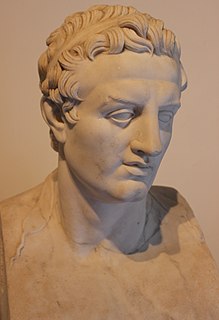
Ptolemy III Euergetes was the third king of the Ptolemaic dynasty in Egypt from 246 to 222 BC. The Ptolemaic Kingdom reached the height of its power during his reign.

Ptolemy XIII Theos Philopator was Pharaoh of Egypt from 51 to 47 BC, and one of the last members of the Ptolemaic dynasty. He was the son of Ptolemy XII and the brother of and co-ruler with Cleopatra VII. Cleopatra's exit from Egypt caused a civil war to break out between the pharaohs. Ptolemy later ruled jointly with his other sister, Arsinoe IV.

Ptolemy I Soter was a companion and historian of Alexander the Great of the Kingdom of Macedon in northern Greece who became ruler of Egypt, part of Alexander's former empire. Ptolemy was pharaoh of Ptolemaic Egypt from 305/304 BC to his death. He was the founder of the Ptolemaic dynasty which ruled Egypt until the death of Cleopatra in 30 BC, turning the country into a Hellenistic kingdom and Alexandria into a center of Greek culture.
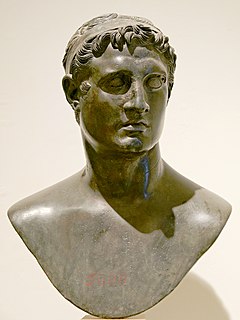
Ptolemy II Philadelphus was the pharaoh of Ptolemaic Egypt from 283 to 246 BC. He was the son of Ptolemy I Soter, the Macedonian Greek general of Alexander the Great who founded the Ptolemaic Kingdom after the death of Alexander, and queen Berenice I, originally from Macedon in northern Greece.
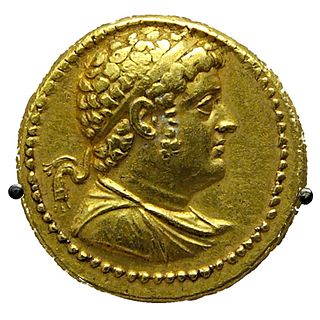
Ptolemy IV Philopator, son of Ptolemy III and Berenice II, was the fourth Pharaoh of Ptolemaic Egypt from 221 to 204 BC.
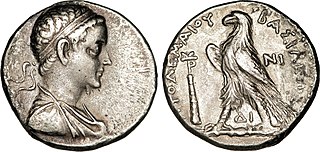
Ptolemy V Epiphanes, son of the siblings Ptolemy IV Philopator and Arsinoe III of Egypt, was the fifth ruler of the Ptolemaic dynasty from July/August 204 to September 180 BC.

Ptolemy VI Philometor was a king of Egypt from the Ptolemaic period. He reigned from 180 to 164 BC and from 163 to 145 BC. The eldest son of Ptolemy V Epiphanes and Cleopatra I of Egypt, he came to the throne as a very young child in 180 BC and the kingdom was governed by regents: his mother until her death in 178 or 177 BC and then two of her associates, Eulaeus and Lenaeus until 169 BC. From 170 BC, his sister-wife Cleopatra II and his younger brother Ptolemy VIII Euergetes were co-rulers alongside him.
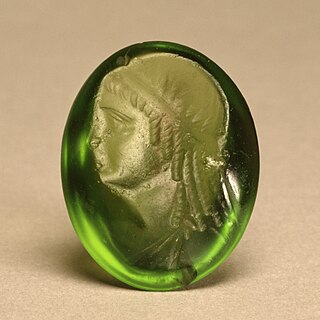
Cleopatra II was a queen of Ptolemaic Egypt who ruled from 175 to 116 BC with two successive brother-husbands and her daughter—often in rivalry with her brother Ptolemy VIII.

Ptolemy VII Neos Philopator was an Egyptian king of the Ptolemaic period. His reign is controversial, and it is possible that he did not reign at all, but was only granted royal dignity posthumously. He was a son of Ptolemy VI Philometor and Cleopatra II of Egypt.

Ptolemy XII Neos Dionysos Philopator Philadelphos was a king of the Ptolemaic dynasty of Ancient Egypt. He was commonly known as Auletes, referring to the king's love of playing the flute in Dionysian festivals. As a member of the Ptolemaic dynasty, he was a descendant of its founder, Ptolemy I.
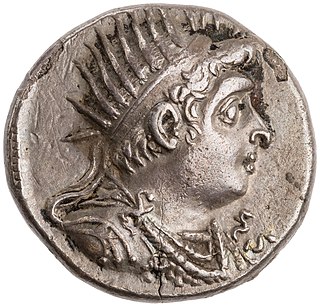
Ptolemy VIII Euergetes II Tryphon, nicknamed Physcon, was a king of the Ptolemaic dynasty in Egypt. He was the younger son of Ptolemy V Epiphanes and Cleopatra I Syra. His reign was characterised by fierce political and military conflict with his older brother Ptolemy VI Philometor and his sister Cleopatra II.

Ptolemy IX Soter II, commonly nicknamed Lathyros, reigned twice as king of Ptolemaic Egypt: first as Ptolemy Philometor Soter in joint rule with his Cleopatra II and Cleopatra III, and then again as Ptolemy Soter. He was the son of Ptolemy VIII and Cleopatra III.
Ptolemy XI Alexander II was a member of the Ptolemaic dynasty who ruled Egypt for a few days in 80 BC. He was a son of Ptolemy X Alexander I and Cleopatra Selene.

Ptolemy X Alexander I was King of Egypt from 107 BC till his death in 88 BC, in co-regency with Cleopatra III as Ptolemy Philometor Soter until 101 BC, and then with Berenice III as Ptolemy Philadelphus. He was a son of Ptolemy VIII Physcon and Cleopatra III, and younger brother of Ptolemy IX. His birth name was probably Alexander.

Cleopatra III was a queen of Egypt. She ruled at first with her mother Cleopatra II and husband Ptolemy VIII from 142 to 131 BC and again from 127 to 116 BC. She then ruled with her sons Ptolemy IX and Ptolemy X from 116 to 101 BC.

The Geography, also known by its Latin names as the Geographia and the Cosmographia, is a gazetteer, an atlas, and a treatise on cartography, compiling the geographical knowledge of the 2nd-century Roman Empire. Originally written by Claudius Ptolemy in Greek at Alexandria around AD 150, the work was a revision of a now-lost atlas by Marinus of Tyre using additional Roman and Persian gazetteers and new principles. Its translation into Arabic in the 9th century and Latin in 1406 was highly influential on the geographical knowledge and cartographic traditions of the medieval Caliphate and Renaissance Europe.

The Ptolemaic Kingdom was an ancient Hellenistic state based in Egypt. It was founded in 305 BC by Ptolemy I Soter, a companion of Alexander the Great, and lasted until the death of Cleopatra in 30 BC. Ruling for nearly three centuries, the Ptolemies were the longest and final Egyptian dynasty of ancient origin.
References
| | This Italian history article is a stub. You can help Wikipedia by expanding it. |
| | This article about an ethnic group in Europe is a stub. You can help Wikipedia by expanding it. |